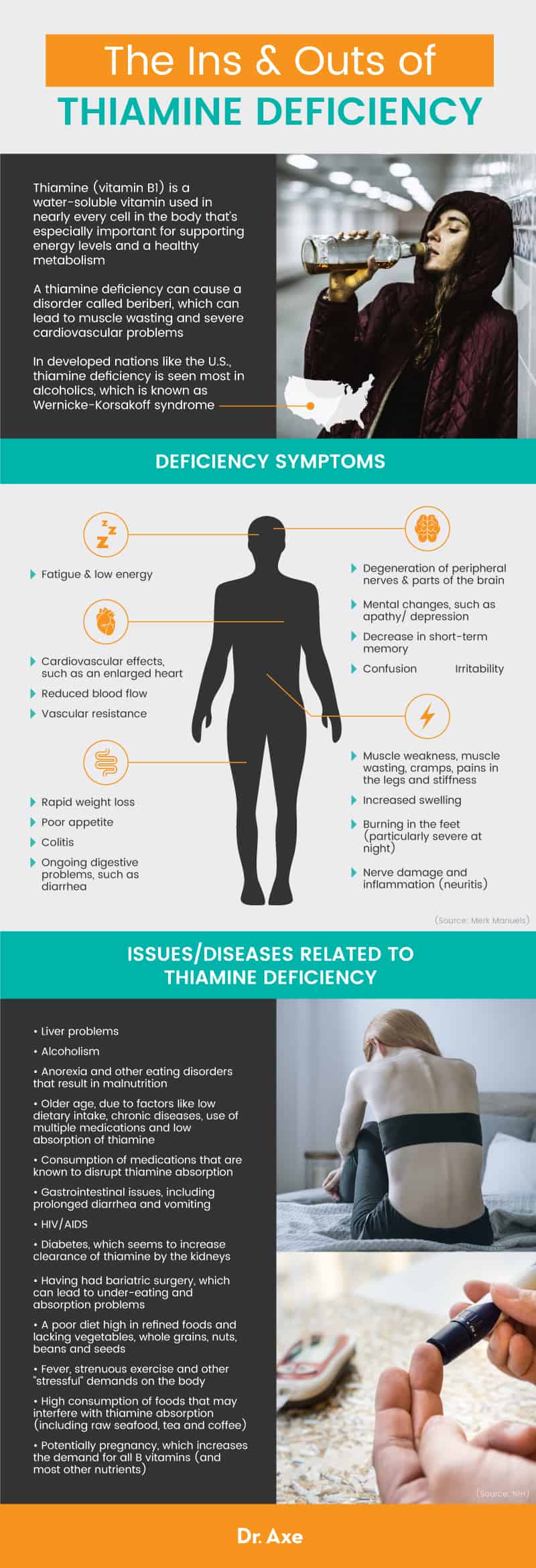This Dr. Axe content is medically reviewed or fact checked to ensure factually accurate information.
With strict editorial sourcing guidelines, we only link to academic research institutions, reputable media sites and, when research is available, medically peer-reviewed studies. Note that the numbers in parentheses (1, 2, etc.) are clickable links to these studies.
The information in our articles is NOT intended to replace a one-on-one relationship with a qualified health care professional and is not intended as medical advice.
This article is based on scientific evidence, written by experts and fact checked by our trained editorial staff. Note that the numbers in parentheses (1, 2, etc.) are clickable links to medically peer-reviewed studies.
Our team includes licensed nutritionists and dietitians, certified health education specialists, as well as certified strength and conditioning specialists, personal trainers and corrective exercise specialists. Our team aims to be not only thorough with its research, but also objective and unbiased.
The information in our articles is NOT intended to replace a one-on-one relationship with a qualified health care professional and is not intended as medical advice.
Thiamine Deficiency Symptoms & Dangers You Don’t Want to Ignore
August 28, 2023

Vitamin B1, which is also referred to as thiamine, is a coenzyme used by the body to metabolize food for energy and to maintain proper heart and nerve functions. Thiamine has the important role of helping us digest and extract energy from the foods we eat by turning nutrients into useable energy in the form of adenosine triphosphate (ATP). Thus, a thiamine deficiency is something you definitely want to avoid.
What happens if you get too little vitamin B1? Without high enough levels of thiamine, the molecules found in carbohydrates and proteins (in the form of branched-chain amino acids) cannot be properly used by the body to carry out various important functions.
What are some symptoms of vitamin B1 deficiency? A thiamine deficiency (also referred to as beriberi) can cause weakness, chronic fatigue, heart complications, psychosis and nerve damage.
The best way to prevent thiamine deficiency is to eat whole foods that supply high amounts of B vitamins, particularly thiamine foods. Thiamine can be found in many commonly eaten foods, including certain whole grains, beans, nuts, nutritional yeast, organ meats like liver and other meats. Additionally, it is included in many vitamin B complex supplement products, which can also help prevent a thiamine deficiency.
What Is Thiamine?
Thiamine (vitamin B1) is a water-soluble vitamin that is used in nearly every cell in the body. It is especially important for supporting energy levels and a healthy metabolism. Thiamine is technically a sulfur-containing derivative of thiazole and pyrimidine. It is used in combination with other B vitamins, which make up the “B vitamin complex,” to regulate important functions of the cardiovascular system, endocrine system and digestive system.
The human body cannot produce thiamine, so we must ingest it from our diet to prevent thiamine deficiency. What is the disease caused by a deficiency of thiamine? A thiamine deficiency can cause a disorder called beriberi, which has been seen in certain undernourished populations for thousands of years. Beriberi can lead to muscle wasting and severe cardiovascular problems, including an enlarged heart.
Thiamine deficiency is not very common in Western, developed nations. It’s believed that most adults meet their daily thiamine requirement, and with supplementation included, some adults may get significantly more than their required daily intake.
Today, in developed nations like the U.S., we most commonly see a thiamine deficiency in alcoholics, which is known as Wernicke-Korsakoff syndrome. Why do many alcoholics develop thiamine deficiency? Chronic alcohol consumption can cause inadequate nutritional thiamine intake, decreased absorption of thiamine from the gastrointestinal tract and impaired ability for cells to use thiamine.
Most alcoholics that are diagnosed with this disorder also report not eating much food in addition to drinking a lot of alcohol, which is a big contributing factor to thiamine deficiency symptoms.
Symptoms
What are the symptoms of low thiamine? Clinical thiamine deficiency symptoms (or symptoms of beriberi) can include:
- Rapid weight loss
- Poor appetite
- Colitis
- Ongoing digestive problems, such as diarrhea
- Nerve damage
- Burning in the feet (particularly severe at night)
- Nerve inflammation (neuritis)
- Fatigue and low energy
- Decrease in short-term memory
- Confusion
- Irritability
- Muscle weakness, muscle wasting, cramps, pains in the legs and stiffness
- Mental changes, such as apathy or depression
- Cardiovascular effects, such as an enlarged heart
What happens if you don’t have enough thiamine in your body? Your brain, heart, and other tissues and organs suffer from low thiamine levels.
High concentrations of thiamine are normally found in skeletal muscles and in the heart, liver, kidneys and brain. Thiamin deficiency causes degeneration of peripheral nerves and parts of the brain, including the thalamus and cerebellum. Deficiency can also reduce blood flow, cause vascular resistance, increase swelling and cause heart to become dilated.

Issues
What causes low thiamine levels? It’s believed that thiamine may not properly be absorbed by people who deal with the following conditions/diseases:
- Liver problems
- Alcoholism
- Anorexia and other eating disorders that result in malnutrition
- Older age, due to factors like low dietary intake, chronic diseases, use of multiple medications and low absorption of thiamine
- Consumption of medications that are known to disrupt thiamine absorption
- Gastrointestinal issues, including prolonged diarrhea and vomiting
- HIV/AIDS
- Diabetes, which seems to increase clearance of thiamine by the kidneys
- Having had bariatric surgery, which can lead to under-eating and absorption problems
- A poor diet high in refined foods and lacking vegetables, whole grains, nuts, beans and seeds
- Fever, strenuous exercise and other “stressful” demands on the body
- High consumption of foods that may interfere with thiamine absorption (including raw seafood, tea and coffee)
- Potentially pregnancy, which increases the demand for all B vitamins (and most other nutrients)
Certain substances in coffee and tea, called tannins, can react with thiamine by turning it into a form that is difficult for the body to absorb. This may potentially lead to digestive problems and a thiamine deficiency. This is rarely seen in Western populations and is believed to only occur when someone drinks a very large amount of caffeine, leading to caffeine overdose.
Most researchers believe that the interaction between coffee and tea and thiamine is likely nothing to worry about unless someone’s diet is very low in thiamine and also vitamin C. This is because vitamin C seems to prevent the interaction between thiamine and the tannins in coffee and tea.
Research also shows that raw, freshwater fish and shellfish can contain chemicals that destroy thiamine. This has been seen in people who eat high amounts of raw seafood, but cooked fish and seafood do not cause the same problem.
Some research suggests that certain nuts called areca (betel) nuts can change thiamine chemically so it doesn’t work as well. At this time there isn’t much research to conclude how thiamine may interact with any other medicines, so before taking a supplement, talk with your health professional if you take any medications.
Recommended Daily Intake
How much thiamine/vitamin B1 do you need per day? Most foods are a good source of thiamine. The recommended daily intake for thiamine is as follows:
- Birth to 6 months — 0.2 mg
- 7–12 months — 0.3 mg
- 1–3 years — 0.5 mg
- 4–8 years — 0.6 mg
- 9–13 years — 0.9 mg
- 14–18 years — 1.2 mg for males; 1.0 mg for females; 1.4 mg for females who are pregnant or lactating
- 19–50 years — 1.2 mg for males; 1.1 mg for females; 1.4 mg for females who are pregnant or lactating
- 51+ years — 1.2 mg for males; 1.1 mg for females
In other words, 1.2 milligrams a day for men and 1.1 milligrams a day for women. Breastfeeding and pregnant women need more, about 1.4–1.5 milligrams per day.
For adults with low levels of thiamine, the usual dose of thiamine is five to 30 milligrams daily in either a single dose or divided doses for one month. The amount that you need depends on your sex, age and level of activity. Factors like stress, exercise, illness and pregnancy all increase your need for thiamine foods.
The typical dose for severe thiamine deficiency can be up to 300 milligrams per day, although this is only prescribed by doctors and used in certain cases. High doses of thiamine are given to those with thiamine deficiency to prevent complications.
Up to 10 to 30 milligrams a day can be given to treat neuropathy, 100 milligrams via IV once a day for several days can be given to treat edema and cardiovascular complications, and 50 to 100 milligrams may be given by IV to those with Wernicke-Korsakoff syndrome.
As with all nutrients, it’s best to try to obtain them from actual whole food sources as opposed to supplements whenever possible. Thiamine deficiency does not seem to be common, according to studies, so for the average person, supplementing with extra thiamine is not necessary.
Vitamin B1 is normally included in vitamin B complex supplements. Most complex supplements include vitamin B1 (thiamine), vitamin B2 (riboflavin), vitamin B3 (niacin/niacinamide), vitamin B5 (pantothenic acid), vitamin B6, vitamin B12 and other vitamins that work together to produce energy through effective food absorption.
If you are going to take a supplement that contains thiamine, look for a high-quality product that is made from real food sources.
How to Increase Intake
The richest food sources of thiamine include various beans, nuts, seeds, seaweed (or spirulina powder) and yeast — especially “nutritional yeast,” which is a seasoning commonly used by vegetarians that naturally tastes similarly to cheese. Some types of meats and meat organs, including liver, also contain smaller amounts, as do certain whole grains like oats and barley.
Thiamine is usually found in most whole-grain and enriched grain products like breads, pastas, rice and fortified cereal grains. These foods are enriched with thiamine, meaning thiamine is added into the food synthetically.
While some of these foods do naturally contain thiamine in their whole, unprocessed form, a lot of the foods’ natural vitamins are lost during the refining process and therefore must be added back in after. In products where thiamine is added to the food synthetically, you will usually see the words “enriched” or “fortified.” Unlike processed products, whole foods like nuts, beans and seeds naturally contain a high amount of thiamine
What is a good source of thiamine if you’re a vegetarian or vegan (you avoid eating meat)? Most fruits and vegetables do not provide very high amounts of thiamine, although some like peas and tomatoes do contain low or moderate amounts. Other kinds like asparagus, potatoes, mushrooms, romaine lettuce, spinach, Brussels sprouts and eggplant include small amounts of B vitamins like thiamine, so when you consume high amounts of these you are getting a good dose.
Risks and Side Effects
Can you overdose on vitamin B1? In other words, in very high amounts, is thiamine poisonous?
As of now, there have been very few confirmed cases of very serious adverse effects reported after taking too much thiamine. There is not much concern over consuming too much thiamine at one time because it is a water-soluble vitamin, and it’s believed that only a small percentage of a high dose of thiamine is actually absorbed by the body.
The excess levels that the body does not need results in urinary excretion of the vitamin within a few hours. Extra vitamin B1 in supplement form will not cause damage in the body, but it also isn’t necessarily one of the most crucial nutrients to obtain in supplement form either.
Final Thoughts
- Thiamine (vitamin B1) is a water-soluble vitamin that is important for supporting energy levels, cognitive health, heart functions and a healthy metabolism.
- What happens when you have a thiamine deficiency? Thiamine is present in all cells of the body, so thiamine deficiency affects all organ systems, especially cells of the nervous system and heart. Inadequate thiamine intake can lead to cardiovascular complications, cognitive problems, fatigue, nerve damage, muscle weakness and interfere with the body’s defense against oxidative stress.
- People at an increased risk of developing thiamine deficiency include alcoholics, those with anorexia, people with liver damage or liver disease, and those eating too little calories or lots of processed/refined foods.
- How much B1 can you take a day? The recommended intake of thiamine for adults is 1.2 mg/day for men and 1.1 mg/day for women. Most people consuming enough calories get this amount from their diets without needing to supplement.
- Can you overdose on thiamine? Thiamine is water-soluble and therefore excess amounts are urinated out. Extra vitamin B1 in supplement form will not cause damage in the body, but it also isn’t necessarily or usually beneficial.










